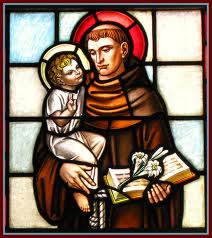
From Sicily he came to Assisi to attend the General Chapter of his Order, and thence withdrew himself to the Hermitage of Monte Paolo near Bologna, where he gave himself up for a long while to consideration of the things of God, to fastings, and to watchings. Being afterward ordained Priest, and sent to preach the Gospel, his wisdom and fluency were very marked, and drew on him such admiration of men, that the Pope, once hearing him preach, called him The Ark of the Covenant. One of his chief points was to expend all his strength in attacking heresies, whence he gained the name of the Heretics' everlasting Hammer.
He was the first of his Order who, on account of his excellent gift of teaching, publicly lectured at Bologna on the interpretation of Holy Scripture, and directed the studies of his brethren. He travelled through many provinces. The year before his death he came to Padua, where he left some remarkable records of his holy life. After having undergone much toil for the glory of God, full of good works and miracles, he fell asleep in the Lord upon the 13th day of June, in the year of salvation 1231. Pope Gregory IX enrolled his name among those of the Holy Confessors, and Pius XII, having consulted the Congregation of Sacred Rites, declared him a Doctor of the universal Church.
A Homily by St. Augustine the Bishop
on Mathhew Chap. 5, 13-19
Lib. 1 de Sermone Domini in monte, cap. 6
The Lord would have us understand how that men do lose their power of savouring others with righteousness when they are willing to place their eternal welfare in jeopardy for the sake of any temporal advantage, like as attainment of ease or luxury, or escape from suffering or toil. For that which is eternal, unlike things of this world, can neither be bestowed by men, nor by them taken away. Hence, when he asketh: If the salt have lost his savour, wherewith shall it be salted? he would have us understand the question to be: If ye, by whom mankind is preserved from corruption, be willing to lose the kingdom of heaven so as to escape trials or persecutions in this world, who is there to preserve you from corruption, seeing ye are they that God hath chosen to preserve all others from corruption?
Those that should be the salt of the earth, but have lost their savour, are thenceforth good for nothing, but to be cast out, and to be trodden under foot of men. But no one that suffereth persecution is truly said to be trodden under foot of men. Rather, that one is truly trodden under foot of men who through fear of persecution hath lost the savour of righteousness. For no one can be trodden upon, unless he be beneath him which treadeth upon him. And certainly no one who hath his heart in heaven, no matter how grievously he doth suffer in his body on earth, is rightly said to be beneath anyone who misuseth him.
Ye are the light of the world. And we are to understand the word World in the same sense as the word Earth when he spoke above of the salt of the earth, that is, not that earth whereupon we walk with our bodily feet, but the men which dwell upon the earth; in other words, sinners, for the sweetening and correction of whose corruption, the Lord hath sent his Apostles, as it were, as so much salt. And so by the world we are to understand, not the heaven and the earth, but the men who are in the world and love the world, for the enlightening of whom the Apostles have been sent. A city that is set on a hill cannot be hid: that is, what is founded upon the heights of righteousness, whereof the mountain upon which the Lord gave this discourse was itself a figure, is magnificent in the eyes of all men.




